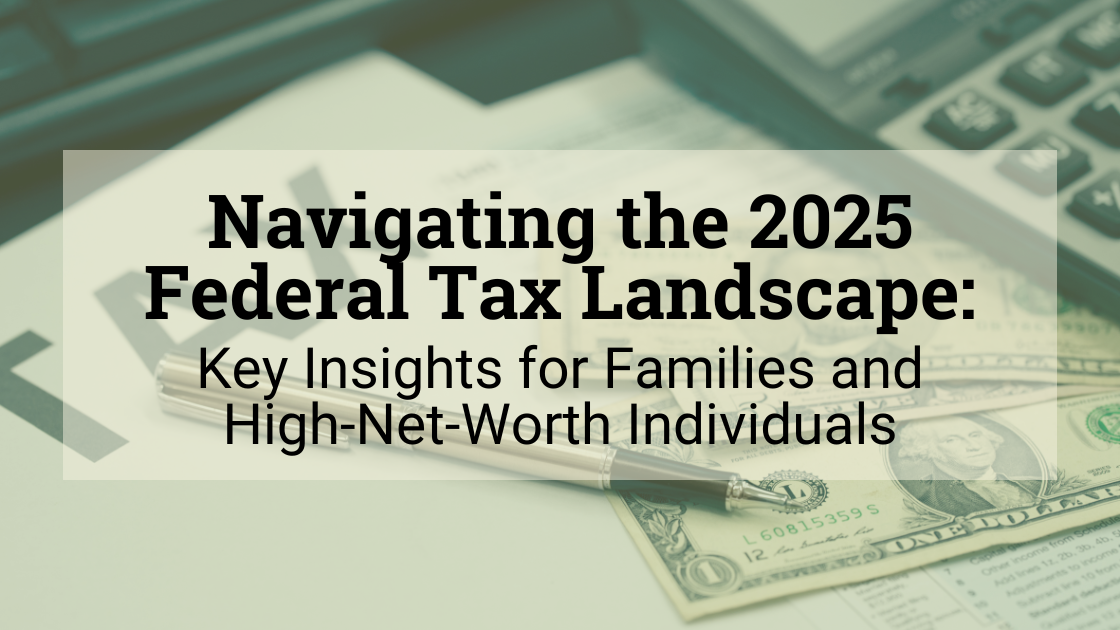As part of our commitment to providing comprehensive legal and financial guidance, we are pleased to share the 2025 Federal Tax Rate Guide created by Brisbane Consulting Group, LLC and Paul Herlan. This resource outlines updates that may affect our client’s personal and business financial planning—especially for those navigating complex family law matters with financial and tax consequences.
Highlights from the 2025 Guide Include:
- Income Tax Brackets: Updated tax rates across all filing statuses, including higher thresholds for top marginal rates. These changes can significantly impact support calculations and post-divorce financial planning.
- Retirement Contributions: Increased limits for 401(k), IRA, and SIMPLE accounts, including catch-up contributions for taxpayers over 50—important for individuals restructuring their retirement savings after divorce.
- Estate and Gift Tax Exemptions: The lifetime exemption amount has risen to $13.99 million, with a 40% top tax rate. For high-net-worth clients, this presents planning opportunities regarding intergenerational transfers and marital trusts.
- Section 199A Deductions: Pass-through business owners may continue to benefit from a 20% deduction, but with specific income thresholds and limits that must be carefully assessed during asset valuation and division.
- Standard Deductions and Credits: Updates to child tax credits, education deductions, and health-related accounts may also influence family budgets and financial planning following separation.
- & More: The guide comprehensively covers information that will be helpful to know for the 2025 tax season.
Understanding these changes is essential not just for tax compliance, but also for negotiating equitable settlements and crafting long-term financial strategies.
Click here to access the PDF guide.
What Should I Know About Divorcing and My Taxes?
Divorce can change the way you look at your taxes and finances drastically. For one thing, your marital status on December 31 will be what your filing status is based on, even if changes have been made since then. Newly separated individuals may need to file as “married filing separately” or consider head of household status if they meet the IRS criteria. Also, only one parent can claim child related tax credits. If each of you do so, it could lead to a dispute with the IRS. This information should be outlined explicitly in the divorce agreement, and New York courts may also designate who claims the exemption.
There is also the consideration of asset transfers and capital gains. While any high value assets and property transferred to you may not affect you during that tax year, future capital gains should be considered. And speaking of assets, contributions, withdrawals, and Qualified Domestic Relations Orders (QDROs) must be managed carefully to avoid penalties or unintended tax consequences of money placed in retirement and health accounts.
Tax law is an active factor in divorce strategy. With accurate financial disclosures, tax guidance, and legal insight, you can position yourself for a more secure future post-divorce.
Contact Experienced New York Divorce Attorneys Today
We thank Brisbane Consulting Group, LLC and Paul Herlan for their detailed and timely analysis. If you’re going through a divorce, now is the time to consider how your divorce now will affect your taxes later. Getting a quick divorce now and figuring it out later is not the answer. The right divorce and family attorney will make sure to keep certain essential pieces in mind in order to protect you financially for the months and years to come.
If you have questions about how these tax updates may impact your family law matter, please contact our office. Lisa Zeiderman is happy to sit down with you and discuss what to expect for the 2025 tax season, and what it will mean for you during your divorce.

